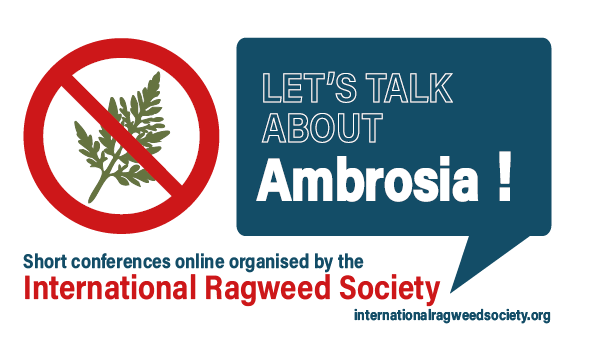February 3, 2025 – The International Ragweed Society (IRS) committee met online to discuss recent developments, ongoing projects, and future plans for 2025. The meeting, attended by all Committee members, focused on the outcomes of the
2024 World Aerobiology Conference, upcoming leadership elections, and the latest research on Ambrosia pollen.
Looking Back: 2024 in Review
IRS President, Prof. László Makra, noted that the World Aerobiology Conference 2024 in Vilnius, Lithuania, saw strong participation, although some IRS members were unable to attend. A major highlight was the ragweed-focused scientific session, featuring cutting-edge research on Ambrosia pollen monitoring and transports, meteorological modeling, invasion dynamics and real-time detection technologies, showcasing research from Lithuania, Italy, Turkey, France, and Poland. Among the notable studies presented were:
- Ragweed Pollen and Atmospheric Circulation in Lithuania
- Aerotape: Real-Time Optical Detection of Ragweed Pollen
- Hotspots of Ragweed Pollen in Türkiye and Meteorological Impacts
IRS also provided scholarships to three new members, reinforcing its commitment to supporting emerging researchers in the field. The organization maintains a strong financial position, with membership fees remaining stable for 2025.
Plans for 2025: Strengthening Research and Leadership
With the committee’s mandate officially ending in 2024, current IRS President László Makra has agreed to continue his role through 2026. However, a formal election process will be announced at the next General Assembly, potentially scheduled after the upcoming “Let’s Talk About Ambrosia” lecture.
Also, Tristan Grausi joining the committee to replace Marilou Mottet.
A key priority for IRS in 2025 will be the proposed special journal issue on Ambrosia-related studies, which has received strong support from committee members. The society also plans to expand its online lecture series, with the next talk focusing on Ophraella-Ambrosia interactions, led by the research team of Nicolas Desneux.
Expanding the Scientific Frontier
IRS committee members demonstrated remarkable research productivity in 2024, with 25 scientific publications on ragweed and its pollen. Leading contributors included Yan Sun & Heinz Müller-Schärer (8 papers) and Victoria Rodinkova (6 papers). These publications cover a broad spectrum of topics, from pollen exposure modeling to Bayesian analysis of sensitization patterns.
New Research and Global Collaboration
Discussions also highlighted ongoing and planned ragweed-related research projects. These research projects span global pollen monitoring, machine learning applications, plant-soil evolutionary feedbacks, and human health impacts.
- Yan Sun & Heinz Müller-Schärer are leading multiple projects, including studies on plant-soil interactions and genetic drivers of male/female flower production.
- László Makra is working on machine learning models to predict pollen exposure under future climate scenarios.
- Victoria Rodinkova is spearheading new research on sensitization to Ambrosia pollen in Ukraine.
Additionally, IRS members expressed interest in developing a large-scale European research initiative, possibly under the COST framework.
Enhancing Public Awareness
Recognizing the need for effective science communication, the committee proposed creating informational materials on ragweed invasion and its impacts. These resources, created for both scientists and the general public, could be integrated into press releases and awareness campaigns, including Ragweed Day initiatives.
Looking Ahead
The next IRS committee meeting is expected in April or May 2025, providing an opportunity to finalize research plans and solidify organizational goals for the year ahead. As IRS continues its mission, 2025 promises to be a year of scientific collaboration, strategic expansion, and impactful outreach in the fight against ragweed-related health challenges. The IRS continues to play a crucial role in coordinating international research efforts on ragweed, a plant species of significant environmental and public health concern.
